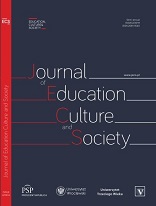Early childhood identity: ethnicity and acculturation
Early childhood identity: ethnicity and acculturation
Author(s): Maria DanSubject(s): Psychology
Published by: Fundacja Pro Scientia Publica
Keywords: ethnic identity; acculturation; child wellbeing; belonging
Summary/Abstract: How are concepts such as ethnic identity, acculturation and cultural orientation being perceived by a child? What is the process of identity construction in early preschool age? How is children’s wellbeing affected by parents’ desire to expose them to a certain culture, other than the one the children were born into? How natural is learning a foreign language for children, given a multiethnic space characterized by adversity and disparities such as “them”-“us”? And what are the potential outcomes of the phenomena in question? These are a few questions that the current study reflectively followed up upon by using a qualitative research design and data triangulation in order to increase its validity. The SDQ Questionnaire used to study the children’s wellbeing, the semi-structured “in-depth” interviews conducted on the main early preschool identity builders in the Cristian community and the participative observation indicated the children were proud to be part of the German department group. They did not undergo a brutal process of affiliation to the Saxon ethnicity due to the educators’ various compromises, and their wellbeing didn’t seem to be affected at the SDQ administration stage. However, learning German proved to be a difficult process and the two potential outcomes included hitting the language barrier or resuming adaptation to the native ethnic code. This study highlights the impact of the cultural code on the early identity foundation.
Journal: The Journal of Education, Culture, and Society
- Issue Year: 5/2014
- Issue No: 1
- Page Range: 145-157
- Page Count: 12
- Language: English

